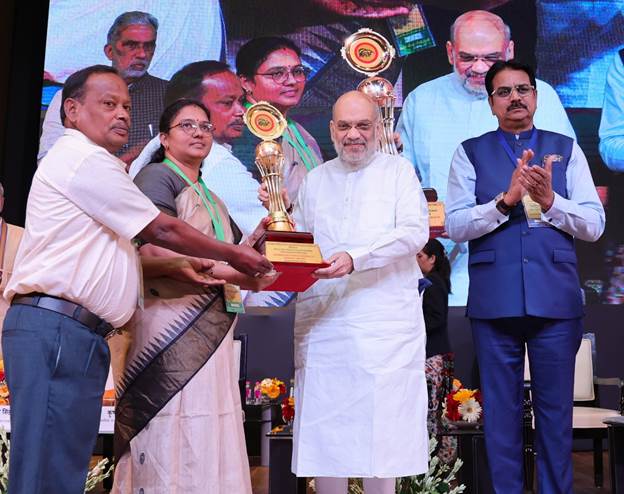New Delhi: Union Home Minister and Minister of Cooperation, Amit Shah, attended the Sugar Industry Symposium and National Efficiency Awards 2022-23 function of the National Federation of Cooperative Sugar Factories (NFCSF) in New Delhi today. As the Chief Guest, Shah presented National Efficiency Awards to cooperative sugar mills excelling in eight different areas.
In his address, Amit Shah emphasized the deep-rooted history of the cooperative movement in India, highlighting the pivotal roles played by states like Gujarat, Maharashtra, Tamil Nadu, and Karnataka. He noted that, despite its significance, the cooperative movement had not evolved as needed post-independence, limiting its impact to a few states. However, he credited Prime Minister Narendra Modi for revitalizing the sector through the creation of a dedicated Ministry of Cooperation, leading to significant progress in recent years.
Shah highlighted the remarkable achievements in the sugarcane sector over the past decade under Prime Minister Modi’s leadership. He noted that the area under sugarcane cultivation has expanded by 18%, from 5 million hectares in 2013-14 to 6 million hectares today. Sugarcane production has surged by 40%, from 352 million tonnes to 491 million tonnes, while sugar production has increased by 58%. Furthermore, ethanol production has seen a dramatic rise, from 38 crore litres to 370 crore litres, with 4.5 million tonnes of sugar now being diverted for ethanol production—a shift from zero diversion in 2013-14.
Shah praised the government’s policy on ethanol blending, which has not only reduced the country’s petrol import bill but also benefitted the environment, increased farmers’ incomes, and boosted the profitability of sugar mills. He reiterated the government’s commitment to achieving 20% ethanol blending by 2025-26, ahead of the original 2030 target, noting that this initiative will have far-reaching benefits for sugarcane farmers and the industry.
The Union Cooperation Minister also discussed the government’s efforts to enhance the viability of sugar mills. He assured support for the establishment of multidimensional biofuel production plants and announced that NAFED will procure 100% of maize and pulses from farmers at the Minimum Support Price (MSP). He highlighted that the highest rate of Rs. 71.86 per litre has been set for ethanol made from maize and bamboo.
Shah also outlined the future goals for cooperative sugar mills, emphasizing the need to increase their contribution to the ethanol supply from the current 8% to 25%. He acknowledged the crucial role of NFCSF in bridging the gap between sugar mills, the government, and technological advancements. He proposed a 10-year roadmap to expand the number of cooperative sugar mills by mapping sugarcane cultivation areas across the country, with the ultimate goal of ensuring that all profits from sugar production benefit farmers directly.
Amit Shah highlighted the Modi government’s efforts to support sugar mills, including the relief provided from a 20-year-old tax liability of Rs. 15,000 crore and the approval of a Rs. 1,000 crore grant under the National Cooperative Development Corporation (NCDC) loan scheme, which will enable loans of up to Rs. 10,000 crore over the next three years. Additionally, he noted the reduction of GST on molasses from 28% to 5%, further aiding the industry’s growth.
In his concluding remarks, Shah urged NFCSF to transform all sugar mills under its ambit into ethanol-producing units within the next two years. He emphasized the need for a dynamic federation focused on the prosperity of sugarcane farmers, rather than merely responding to demand.





